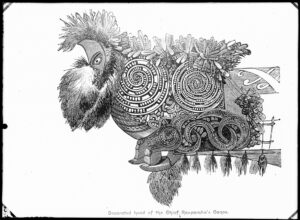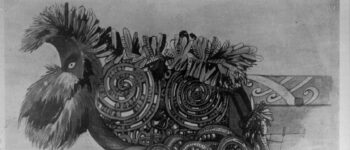1830: Slaughter by Surprise
October 29, 2021
By AHNZ
 Today in New Zealand history, 29 October, 1830, Te Rauparaha and 140 warriors armed with muskets left Kapiti Island to attack Akaroa. Slaughter by surprise was their plan.
Today in New Zealand history, 29 October, 1830, Te Rauparaha and 140 warriors armed with muskets left Kapiti Island to attack Akaroa. Slaughter by surprise was their plan.
Here are two variations of a sketch depicting the bowpiece of Te Rauparaha’s war canoe. One is from the New Zealand Herald via Sir George Grey Special Collections, Auckland Library. The other is a photo of a sketch captured by James Richardson’s camera and held by Auckland Libraries Heritage Collections. Who was the primary source?
 Today’s 1830 warpath was unique in not employing any overt and terrifying bowpiece. Rauparaha’s war party of Ngati Toa hid in Captain John Stewart’s ship Elizabeth, tricking the Ngati Tahu of Akaroa into an ambush. On 6 November they sprang the trap. Akaroa fell.
Today’s 1830 warpath was unique in not employing any overt and terrifying bowpiece. Rauparaha’s war party of Ngati Toa hid in Captain John Stewart’s ship Elizabeth, tricking the Ngati Tahu of Akaroa into an ambush. On 6 November they sprang the trap. Akaroa fell.
Returning to Kapiti victorious a cannibal feast of cooked human meat took up 100 baskets. There were also some 100 prisoners taken back as slaves and to eat later. Some would later be set free to return home.
According to recent comments to AHNZ there were also Europeans present on the Ngai Tahu side during the Fall of Akaroa. An English/Canadian woman named de Carle was spared either by Rauparaha or Stewart. If so, it’s a tantalising hint at ‘Pre-Adamite’ settlers of Canterbury of which we know only a little.
“…the prow of a Viking ship coming up the river. Looked at today in the British Museum it is a powerful work of art; but to the mother of a family trying to settle down in her little hut, it would have seemed less agreeable – as menacing to her civilisation as the periscope of a nuclear submarine.” – Kenneth Clark, Civilisation (1969); Youtube
“I was told by a cousin, many years ago when I was quite young, that an ancestor of mine was the only European woman to have survived the massacre at Akaroa. If still single at the time her maiden name would have been de Carle. She was, I believe, of English/Canadian descent.” – Ron Wareham
“In short, Armageddon came for Ngai Tahu in 1832 when Te Rauparaha’s Ngati Toa war-party invaded from the north. The warrior force called itself The Barracuda Tooth and destroyed the people of Kaiapoi/Kaiapohia in fire and primal violence beyond recovery.” – Operation Barracuda Tooth, AHNZ
Rauparaha was far from finished with the Ngai Tahu after taking down Akaroa. In the new year he brought destruction to Ngai Tahu leaving only the far-south members alive. Somehow the Kaiapoi Ngai Tahu didn’t know or didn’t care about Akaroa enough or Kaikoura (1827) to be properly prepared. Was Ngai Tahu so estranged to itself that an attack on Akaroa was not seen as a threat to Kaiapoi too? Seems to me they were unready for the juggernaut rolling over them.
When Rauparaha’s vassal chief Te Puoho returned in 1836 to clean out the rest of the Ngai Tahu it took him a very long time to find anybody to fight at all. Ref. Skinning The Ngāi Tahu Eel From Tail To Head; AHNZ
The British-Canadian Mrs de Carle who is said to have survived the massacre probably ended up under the protection of Captain Stewart. After dropping off the war party at Kapati and being paid off in a large cargo of flax the Elizabeth returned to Sydney as I recall. Stewart was tried for his crimes against the South Island Maoris in absentee as he had made himself scarce and does not re-appear in our history books. Mrs de Carle probably set herself up a life in New South Wales and perhaps her trail can be found there? If we could learn more about that family we might also learn a great deal about the early settlers of Canterbury prior to the Fall of Akaroa.
—
Richardson photo of a sketch, Auckland Libraries Heritage Collections
New Zealand Herald sketch, Sir George Grey Special Collections
Notes: See The Elizabeth Affair, Kiwi Codger, Youtube (2023)
aka The Elizabeth Incident
 Like Comment Share
Like Comment Share





